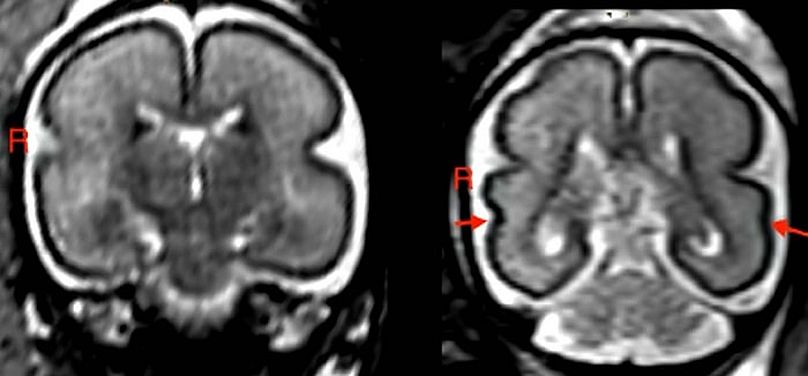Scientists compared the brain MRI scans of foetuses whose mother had drunk alcohol, with those who had not.
Drinking even small amounts of alcohol during pregnancy can change a baby’s brain structure and delay its brain development, according to a new study.
Scientists analysed MRI scans of foetuses whose mothers had reported drinking alcohol during their pregnancies, comparing them with the scans of babies whose mothers hadn’t.
They found that even in cases of low level alcohol exposure, changes to the brain structure were "significant".
It is widely advised by health experts and organisations for pregnant women to avoid alcohol, due to the well-known risk of harming the foetus.
Drinking alcohol during pregnancy can cause conditions called foetal alcohol spectrum disorders, which can lead to the child developing learning difficulties, behavioural problems, or speech and language delays.
The researchers behind the study warned that many pregnant women are still unaware of the potential effects of alcohol on the baby during pregnancy.
"Therefore, it is our responsibility not only to do the research but also to actively educate the public about the effects of alcohol on the foetus," lead author Patric Kienast, a PhD student at the Medical University of Vienna in Austria, said.
'Significant brain changes'
For the study, researchers analysed MRI scans of 24 foetuses that had been exposed to alcohol.
"Foetal MRI is a highly specialised and safe examination method that allows us to make accurate statements about brain maturation prenatally," said senior author Gregor Kasprian, an associate professor of radiology at the Medical University of Vienna.
The foetuses were between 22 and 36 weeks of gestation at the time of the scan.
Alcohol exposure was determined via anonymous surveys of the mothers. In foetuses with alcohol exposure, the foetal total maturation score (fTMS) was significantly lower than in the age-matched controls, and the right superior temporal sulcus (STS) was shallower. The STS is involved in social cognition, audiovisual integration and language perception.
"We found the greatest changes in the temporal brain region and STS," Kasprian said.
"We know that this region, and specifically the formation of the STS, has a great influence on language development during childhood".
Brain changes were seen in the foetuses even at low levels of alcohol exposure.
"Seventeen of 24 mothers drank alcohol relatively infrequently, with average alcohol consumption of less than one alcoholic drink per week," Kienast said.
"Nevertheless, we were able to detect significant changes in these foetuses based on prenatal MRI".
Delayed brain development
Three mothers drank one to three drinks per week, and two mothers drank four to six drinks per week.
One mother consumed an average of 14 or more drinks per week. Six mothers also reported at least one binge drinking event (exceeding four drinks on one occasion) during their pregnancy.
According to the researchers, delayed foetal brain development could be specifically related to a delayed stage of myelination and less distinct gyrification in the frontal and occipital lobes.
The myelination process is critical to brain and nervous system function. Myelin protects nerve cells, allowing them to transmit information faster. Important developmental milestones in infants, such as rolling over, crawling, and language processing are directly linked to myelination.
Gyrification refers to the formation of the folds of the cerebral cortex. This folding enlarges the surface area of the cortex with limited space in the skull, enabling an increase in cognitive performance. When gyrification is diminished, functionality is reduced.
"Pregnant women should strictly avoid alcohol consumption,” Kienast said. “As we show in our study, even low levels of alcohol consumption can lead to structural changes in brain development and delayed brain maturation".
The results of the study will be presented next week at the annual meeting of the Radiological Society of North America (RSNA).












